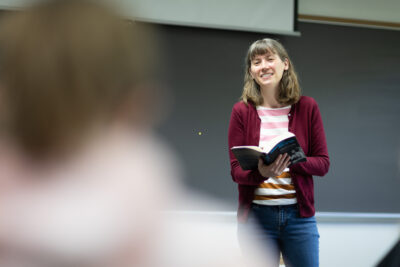“I believe that the dynamics at work in contexts such as the classroom can help to construct more equitable and diverse communities outside of academic settings.”
 What are your areas of research and teaching expertise?
What are your areas of research and teaching expertise?
French and Francophone Literature, Film, and Culture; Holocaust and Genocide Studies; Trauma and Testimony Studies; Feminist Theory; Disability Studies
What is your teaching style?
I mostly teach discussion-based courses in which I guide students to listen attentively to their peers and to base their own arguments on concrete evidence and detailed understandings of our course material. I believe that the dynamics at work in contexts such as the classroom can help to construct more equitable and diverse communities outside of academic settings. At all levels of my courses in French and GWSS, I strive to create a safe and open classroom environment that encourages students to take risks with their language use, their thoughts, and their beliefs. I try to teach students how to confront challenging issues and engage people whose ideas may differ from their own without abandoning their own, well-reasoned values and views. I do not shy away from difficult topics – I instead teach students how to engage them critically and ethically. I specialize in traumas and disasters – events ranging from the Holocaust to the refugee crisis in the Mediterranean and the 2010 Haiti earthquake – and I also teach courses that engage students directly in my research in a variety of ways.
Describe your “lightbulb moment.”
I began my undergraduate studies as a biology major. I was getting straight A’s but was extremely bored, and I switched to studying French after reading an essay on the imagination by French Renaissance philosopher Michel de Montaigne. I wasn’t sure that I agreed with his ideas, but they made me want to grapple with and understand them. My current research interests were also inspired by loving an author’s work. I read Charlotte Delbo’s Auschwitz and After early in graduate school and was completely leveled by the experience. I wanted to figure out how she did it, and this started me on a path I continue to be on studying traumas and disasters and the works produced in relation to them.
What do you enjoy outside the classroom?
I am a devoted researcher, and I spend much of my time outside of the classroom working on my current projects, organizing workshops and seminars with colleagues on campus and across the globe, and learning about new topics (because there are always new things to learn). In addition to this, I am a serious home gardener and I love finding new vegetables to grow every year. (This year, I’m growing four different kinds of eggplant, including a variety that is green!) I love to travel, especially in the French-speaking world, and you can often find me camping in one of Minnesota’s fantastic state parks. I also have a young child, and I am fortunate to be able to spend time with her while she grows and learns to be excited about the world.
What tips do you have for student success?
Do not feel like you have to be involved in everything that’s going on on campus – it can lead to burnout. Be open to new ideas and experiences because this will help you discover what truly interests you and will bring out the approach you need to live a happy and fulfilling life. Do not be afraid to ask questions or ask for help. Always show up for class, especially when you are struggling with your material. Never forget that most of your professors have experienced failure and self-doubt in their own lives. They are here to help!
What campus traditions are your favorite?
I love the non-hierarchical and collaborative nature of the Gustavus community. We are doers, and we do things together. As a professor in GWSS, the Moe Lecture – which brings leading queer and feminist thinkers to campus for a public lecture and series of related events – is also one of my favorite Gustavus events. Everyone is involved in making events like these a success.
What is your favorite author/book?
Charlotte Delbo’s Auschwitz and After, a trilogy of memoirs about the author’s experience in Auschwitz and in its aftermath.
What is your favorite class to teach?
I love teaching all of my courses. If I am forced to choose, I suppose I would say “Gender, Sexuality, and the Holocaust.” Students emerge from the class with an intimate understanding of why we need to examine past events like the Holocaust if we are to confront the challenges of today. It’s humbling and rewarding.
Where is your favorite place on campus/in St Peter?
The Arb. Just a 15 minute there can help energize me and help me refocus.